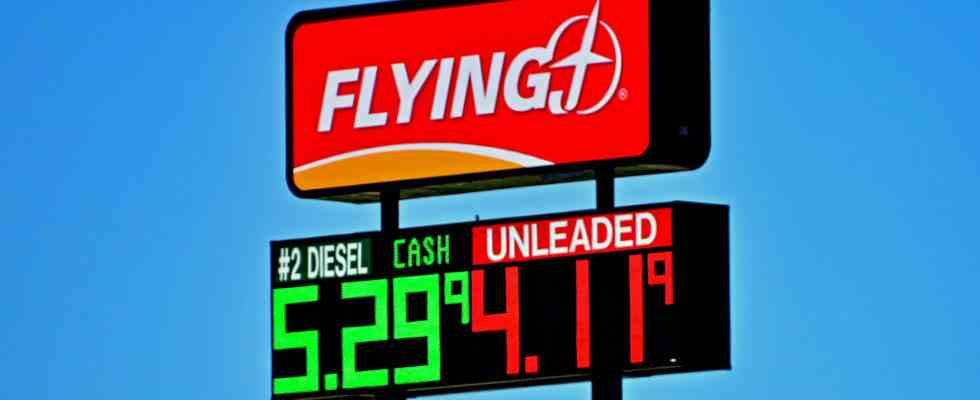Status: 05/25/2022 3:24 p.m
While German motorists are eagerly awaiting the tank discount, Americans are moaning about record-high fuel prices. However, if the US imposes an oil export ban, the tide could turn quickly.
There are only a few days left until the tank discount. From June 1st, consumers at German petrol stations will be relieved of 30 cents per liter of premium and 14 cents per liter of diesel. But even in the run-up to this, maximum prices are no longer paid at German petrol stations. This is shown by the weekly ADAC evaluation of fuel prices in Germany.
After that, a liter of Super E10 currently costs 2,090 euros, as in the previous week. Diesel has fallen by 3.4 cents within a week and currently costs 1.994 euros on average nationwide. For comparison: In March, a peak of more than 2.20 euros was paid for a liter of diesel.
US prices for diesel and regular gasoline at record high
Meanwhile, fuel prices in the US keep climbing to new heights. The diesel price recently reached a record high of 5.58 dollars per gallon (3.785 liters). Regular gasoline set a record at $4.59. A year ago, consumers paid just $3.08 for a gallon of diesel and $2.90 for a gallon of gasoline.
Even if motorists in this country would certainly jump in the face of a diesel liter price of the equivalent of 1.38 euros: For the “driving nation” USA, these are absolutely exorbitant prices.
White House considers ban on exports of oil products
The background to the recent price increases at US gas stations is evidently primarily the limited capacity of the refineries to produce end products such as diesel or gasoline from crude oil. US gasoline inventories are currently at their seasonally lowest level since 2014.
The White House has long recognized the potential for conflict. The US government is considering an export ban on oil products, Energy Secretary Jennifer Granholm said when asked yesterday.
US export ban would ensure rising fuel prices
“The US is a major net exporter of oil products. According to the US Department of Energy, net exports have averaged around four million barrels per day since early April, up from an average of almost three million barrels per day in the previous three months,” he said Commerzbank commodities expert Carsten Fritsch. “An export ban would correspondingly reduce the supply of petrol and diesel on the world market and cause prices to continue to rise.”
Businesses and consumers in the European Union would probably be particularly affected. The EU has not yet been able to agree on an import ban for Russian oil. However, since May 15, deals with the Russian oil companies Rosneft and Gazprom have only been possible if they are “absolutely necessary”.
In view of the legal inaccuracies of this definition, many oil importers in the EU shy away from importing Russian oil – as a precautionary measure – and rely on US oil instead. So what would relieve drivers in the USA could quickly lead to sharply rising prices at gas stations in this country. Heating oil would also become more expensive again.
Is Biden tapping into the national diesel reserves?
However, an export stop for oil products is just one of several ways the Biden administration can relieve the burden on the Americans. According to government insiders, an emergency declaration by the president to release the national diesel reserves is also under discussion. This could counteract the supply bottleneck and the relentless price increase since the outbreak of the Ukraine war – President Joe Biden speaks of “Putin’s price increase”.
Meanwhile, seasonality continues to argue against falling fuel prices on both sides of the Atlantic; After all, the so-called “Driving Season” is already in full swing. “The price increase 20 days before Easter until Pentecost has been around ten percent on average since 1987,” emphasized market expert Robert Rethfeld from Wellenreiter-Invest recently tagesschau.de.
Lockdown end in Shanghai as a price driver?
However, further developments in China are likely to be even more important for the development of prices for oil and oil products. According to statements by Chinese authorities, the lockdown in the economic metropolis of Shanghai is to be lifted on June 1st. China is the world’s largest oil importer. In the past few weeks, the lockdown in Shanghai that has been in place since the end of March has noticeably curbed Chinese demand for oil, thus keeping prices on the world markets in check.
A complete return of China as a buyer to the oil market has the potential to give oil prices a powerful boost again. The future prices at German petrol stations should therefore be made less in Berlin than in Brussels, Shanghai and Washington.

